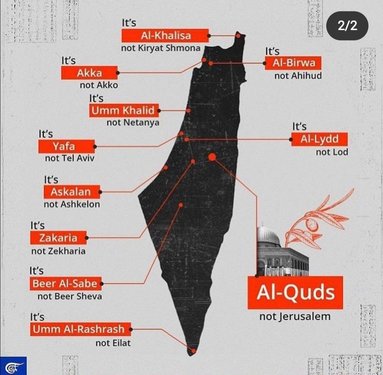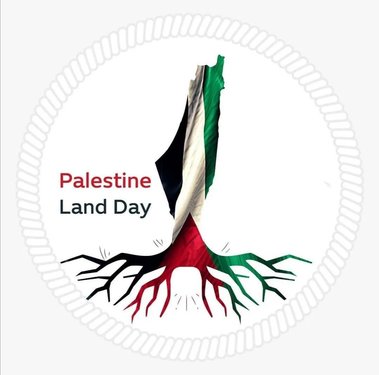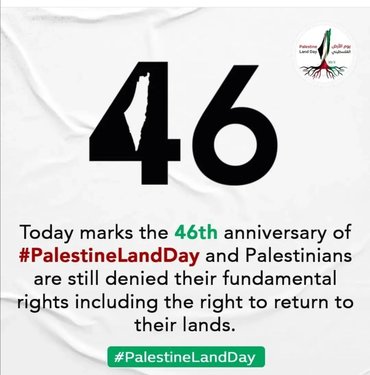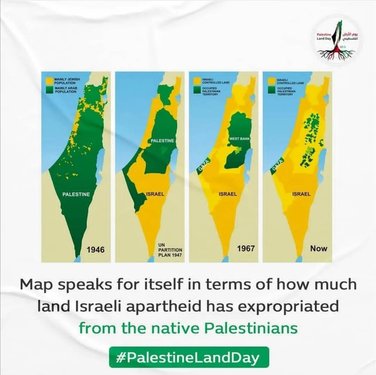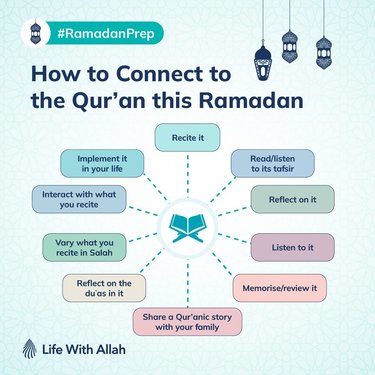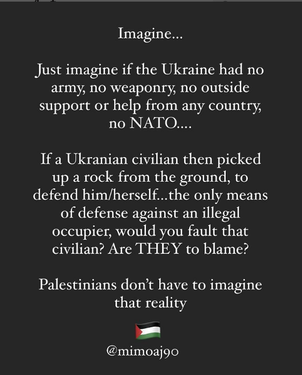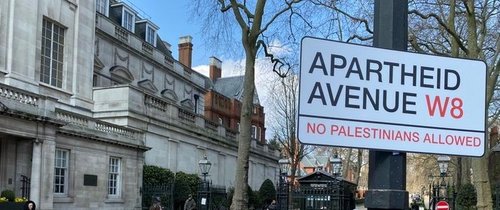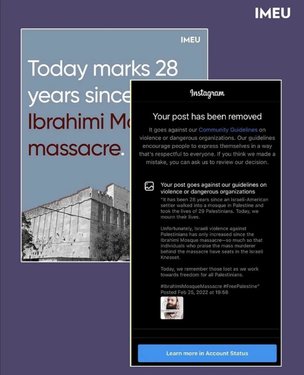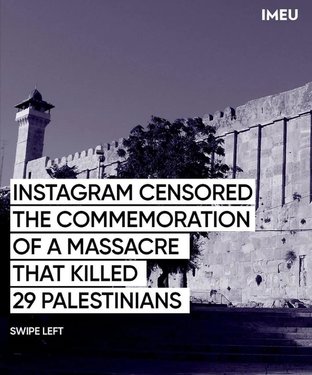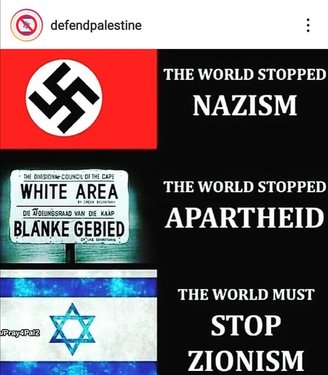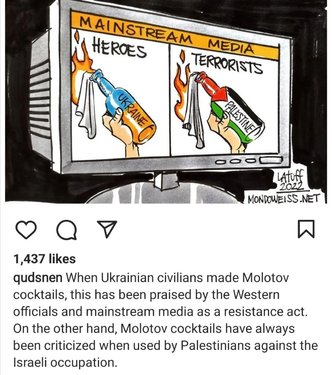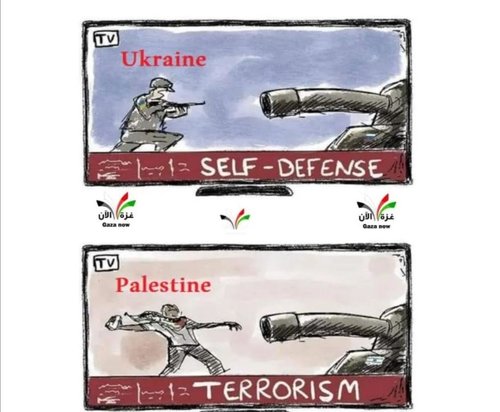-
Posts
8,434 -
Joined
-
Days Won
771
Content Type
Profiles
Forums
Events
Everything posted by ummtaalib
-
"Anti-zionist" Synagogue The Tzedek Chicago Synagogue has declares itself to be "anti-Zíøníst" in a statement decrying the creation of Apartheíd Israel as an "injustice against the Palestinian people".The synagogue was established to cater for Jewísh People disenchanted with Apartheíd Israel and sceptical of Zíønísm generally. It had previously labelled itself "non-Zíøníst " but changed that to "anti-Zíøníst" a few days ago.Source: Middle East Monitor
-
The Salah Series – Life With Allah Ramaḍān is the perfect time to actively develop khushūʿ in your ṣalāh. Khushūʿ is a state in which the heart stands before Allah with complete humility, lowliness and servitude; focusing fully on HimAlone. Then the body also humbles itself and obeys Allah. Khushūʿ is a state in which you constantly weigh up your sins against the greatness of Allah, leaving you overwhelmed with humility and a desperate need for Him. One of our main Ramaḍān goals should be to perform the five farḍ prayers to the best of our abilities. This includes all the additional sunnah prayers and performing them with full concentration, calmness and tranquillity. Similarly, qiyām (the night prayer) in this sacred month is the perfect means to actively work on khushūʿ. We should maximise qiyām to lengthen the various postures, praise Allah extensively, and ask Him for lengthy periods, as our beloved Messenger ﷺ used to do. Taste the Sweetness of Ṣalāh is a guide on how to attain khushūʿ and enjoy your ṣalāh. It offers tips on how to achieve full focus and truly connect with Allah in your ṣalāh. It includes: An explanation of khushūʿand why we struggle with it. Practical steps before, during and after ṣalāh to develop khushūʿ. A journey through ṣalāh. The various adhkār (remembrances) of ṣalāh. The ṣalāh of our beloved Messenger ﷺ and the pious people. The secrets of ṣalāh. Free! In order to make the content of this topic accessible and practical for all, there are three components to ‘Taste the Sweetness of Salah’: (1) The A5 detailed book Taste the Sweetness of Ṣalāh DOWNLOAD TASTE THE SWEETNESS OF ṢALĀH (2) The A6 summary booklet Enjoy Your Ṣalāh DOWNLOAD ENJOY YOUR ṢALĀH (3) The pocket-sized Adhkar of Salah booklet DOWNLOAD THE ADHKAR OF ṢALĀH
-
We live in a world of import and export, a world in which most goods and commodities are available in most countries for most of the year. However, despite the year-round availability, there are many goods that enjoy a ‘peak season’. Astute businessmen are those who identify this period and utilize it to their advantage. Dynamic Effect The season presents a golden opportunity for one to secure tremendous profits in a minimal period of time. Hence, during the month of December, even if the rest of the world is on vacation, it is practically unimaginable for one to find the serious businessman on holiday. He understands the pivotal role that the season plays in his success; if he remains focused and committed, he will reap the profits, and if he allows himself to become distracted or while away his time, he alone will suffer the consequences. The dynamic effect of the season is such that if the shop owner, who struggles to make ends meet for the entire year, exerts himself and exhausts his efforts in this crucial period, he will not only recover his losses, but will even manage to turn a handsome profit. The Season of Taqwa Just as other things have a special season; taqwa also has a special season – the month of Ramadaan. From fasting during the day to performing Taraaweeh during the night, the entire month has been specially designed to assist a believer in harvesting a bumper crop of fruit, from the tree of taqwa, which he will continue to enjoy long after the blessed month has expired. However, just as with other seasons, this will only be possible if one avails himself for this blessed month and expends all his energies in striving to secure the bargains it has on offer. More than Money If the shop owner arrives at work two hours late, he will regret the business that he lost and lament the money that he could have made. For every minute of the two hours, he could have been serving customers and turning the numbers. We often hear the adage ‘time is money’. However, contrary to popular belief, time is NOT money — it is far more valuable than money. Whereas money can always be later recovered if lost, time can never be recovered — and it is for this reason that time is our single greatest asset. In the race to secure the rewards of Ramadaan, it is those who are particular regarding their time that profit the most. Destructive Distractions In this regard, along with the ready-made opportunities to benefit are a host of ready-made distractions. After - Taraaweeh braais, meeting friends for a chat, an ‘Eid bargain-hunting’ excursion – these are all seemingly innocent activities. However, when thoroughly scrutinized, we realize that the braai ‘burnt’ two or three hours of our time, whereas a normal supper would have been concluded in a maximum of thirty minutes. The excursion to purchase ‘Eid-goods at the best prices may have saved us a few valuable rands but undoubtedly cost us invaluable hours and minutes. Media ‘Mania’ In the opinion of many, the uncrowned yet undisputed champion of ‘killing time’ is social media in all its various guises and forms. The magnetic effect of the smartphone transcends metal and hence it is the human eye that remains fixated to the screen. Whether in the masjid, while attending a program for spiritual upliftment, or at the time of sehri when du‘aas are accepted – instead of maximizing and benefiting from these opportunities, there are many who become Media ‘Maniacs’ and wile away the irrecoverable moments on their smart phones. For this purpose, just as we fast by shunning food and drink from dawn to sunset, let us make a resolution to ‘fast’ from all forms of media for all the 24 hours of every day in the Month of Ramadhan. Be it remaining abreast with the news, keeping up to date with Instagram, TikTok & Facebook – we should initiate a complete ’fast’ from all these time-consumers during this blessed period and afterwards as well. Thus let us make this Ramadaan very profitable by correctly investing the capital of time that we have been blessed with. Insha-Allah we will reap the rewards in this world and the Hereafter. alhaadi.org.za
-
by Ustadhah Naielah Ackbarali The Companion Abdullah ibn Mas’ud (Allah be pleased with him) relates that the Prophet ﷺ said: “Menstruation is three days, four days, five days, six days, seven days, eight days, nine days, or ten days. If the bleeding exceeds ten days, then she is not menstruating.” (Darqutni) Along with this hadith and other narrations related about menstruation, the scholars have deduced several conditions that help distinguish whether a woman’s vaginal bleeding can be ruled as menstruation or not. In an effort to make this knowledge easier for women to learn, we’ve attempted to summarize some of these rulings. The following is a basic breakdown of the conditions according to the Hanafi maddhab. Condition #1: The bleeding originates from the uterus. Menstruation is blood that comes from the uterus. The uterus is the medical term for the womb, which is the place where the baby grows during pregnancy. If a woman does not get pregnant after ovulation, her uterine lining will shed approximately two weeks later, and the blood which exits her body is known as menstruation. A woman can automatically assume that her menstrual bleeding originates from the uterus. She is not obliged to double check with a doctor of where her blood is originally coming from, unless there are physical signs that may indicate otherwise, such as a vaginal infection, injury, or sickness. Condition #2: The bleeding exits the vaginal hole. Women have three exit points: the urethra, the vagina, and the anus. Menstrual bleeding is the bleeding that exits through the vaginal hole. How it exits is of no consideration. For example, whether the blood comes out due to a natural flow or by being extracted with toilet paper, the rulings related to the blood exiting apply. If blood exits from the anus or urethra, then that blood is not ruled as menstruation. This is important for women to know because urinary tract infections, anal fissures, and the like can cause bleeding too. Condition #3: The woman can legally experience menstruation. These stipulations relate to the state of the woman herself. She must be at least 9 lunar years old (approximately 8 solar years and 9 months). She must not be pregnant. Pregnant women cannot menstruate. She must not be within the potential timeframe of when post-natal bleeding can occur, which is forty days (960 hours) after childbirth. She must not be older than 55 lunar years (approximately 53 solar years and 4 months). However, exceptions may apply to women who experience bleeding after this age. For more details, please refer to this article: Istihada – What Is It? With Examples. Condition # 4: The menstrual minimum is met. The menstrual minimum is three complete days and nights (i.e. 72 hours). Once bleeding reaches this timeframe, it is ruled as menstruation with certainty. It is important to note that there is no condition for the bleeding to be constant for the entire duration of 72 hours. Rather, the consideration is the beginning and ending times – and not what happens within the duration of 72 hours. Furthermore, any color of vaginal discharge seen within this time takes the ruling of menses, regardless of whether it is red, brown, fresh yellow, or the like. If the menstrual minimum is not met, then the bleeding will not be ruled as menstruation. For more details, please refer to our self-paced course: Your Period Questions. Condition #5: The menstrual maximum is not exceeded. The menstrual maximum is ten complete days and nights (i.e. 240 hours). Menstruation cannot be longer than this duration according to the Sacred Law. It is important to note that there is no condition for menstrual bleeding to be constant. Rather, the consideration is the beginning and ending times – and not what happens within the duration of 240 hours. Furthermore, any color of vaginal discharge seen within this time takes the ruling of menses, regardless of whether it is red, brown, fresh yellow, or the like. If the bleeding does not exceed the menstrual maximum and condition #6 is met, then the entire duration will be ruled as menstruation. If the bleeding exceeds the menstrual maximum, then the entire duration will not be ruled as menstruation. Rather, she will need to resort to her menstruation and purity habits for a solution. For more details, please refer to our self-paced course: Your Period Questions. Condition #6: The minimal duration of purity follows the menstruation. Many women overlook this very important condition! Two menstruations cannot immediately follow each other. There must be a duration without bleeding that follows it. The minimum amount of purity (tuhr) that must occur between two menstruations is 15 complete days (360 hours). This means that for at least 15 complete days after her menstruation finishes, a woman must be free from all colored vaginal discharge. If the second bleeding occurs before this time frame, then it may not be ruled as menstruation. For example, a woman sees 5 days of blood, then 10 days of purity, and then 8 days of blood. The ten days of purity is not long enough to separate between the two bloods. Consequently, the second blood may not be ruled as menstruation. How does she know which days are menstruation then? She will need to resort to her menstruation and purity habits for a solution. This is what will determine which days are menses and which days are non-menses. Muslimah Coaching
-
- menstruation
- hayd
-
(and 1 more)
Tagged with:
-
How to Maximise the Spirit of Ramadan During Menstruation Ramadan represents an important time for Muslims. It is a month inwhich we return ourselves to Allah and the Qur’an. Physically, we abstain from food and water, reminding the body of how little sustenance it needs to thrive. Morally, the Muslim works on improving their character, abstaining from anger, backbiting and obscene language. They guard their ears, eyes, and tongues from engaging in sinful behavior. Spiritually, it is a time of self-reformation and seeking purification from desires (nafs) to bring oneself closer to Allah. We give up the devices of this world (dunya), whether it is our cellphones, music playlists, Netflix subscriptions or social media to bring ourselves in alignment with what Islam asks of us, and in turn, inculcate a deeper sense of God consciousness (taqwa). Before the month even starts, an aura of anticipation and eagerness fills our communities. We circulate lists of goals to be achieved, whether it is increased prayers, recitation of the Qur’an or standing in the night prayer, seeking solace in the company of Allah. For women, menstruation (hayd) can present a distinct challenge – just as they find themselves settling into a Ramadan routine, they start their cycle and are no longer able to fast or pray. For many, this leads to a sense of frustration and questioning as to how they can benefit spiritually. First and foremost, understanding and obeying the command of Allah is in itself a form of worship. So, if a woman refrains from fasting while menstruating, she is gaining reward from her Creator, due to her humility and obedience. Moreover, there are ample ways a woman can worship, affording herself the opportunity to benefit from the blessings of Ramadan even while she is menstruating. In each prayer time, she can perform ablution (wudu), enter into her prayer space and focus her heart on Allah through different means. Allah tells us in the Qur’an, “When My servants ask you about Me [tell them that] I am truly near. I respond to the call of one when he prays to Me; so they should respond to Me [with obedience] and have faith in Me, so that they may be on the right path.” (Surat al-Baqarah 2:186). Below are some practices a woman can partake in during her hayd: 1. Daily Litany (Wird) – Recite a portion from a compiled book of litanies, such as Al-Hizb al-A’zam. These Qur’anic and Prophetic invocations remind the believer of the temporal nature of the dunya and the need to consistently put one’s focus on the hereafter (akhira). 2. Remembrance (Dhikr) – One of the most beloved things to Allah is when his believing servant glorifies and praises Him. Recognising and calling on the attributes of Allah is an important way to strengthen your relationship with Him. 3. Supplication (Du’a) – One of the most intimate and powerful means of communicating with Allah is through du’a. It is through du’a that we turn our affairs over to Allah, we accept His power over all things and our absolute submission to Him. We open our hearts to Allah and ask for His forgiveness, guidance and mercy. 4. Seeking Forgiveness (Istighfar) – Ramadan is a month in which the believer turns to Allah seeking His absolute forgiveness. It is a time when the floodgates of Allah’s mercy are wide open and the believer simply needs to turn toward Allah penitently. Allah knows that His creation will repeatedly sin, but He has also given us the means of erasing those sins through istighfar. 5. Sending Salutations (Salawat) – By sending salawat, a woman is not only fulfilling the command of Allah but increasing the love she has for the Beloved Messenger (may Allah bless him and give him peace), as well as increasing his love for her. Our salawat will envelop us in the mercy and protection of Allah and His Messenger (may Allah bless him and give him peace) on the Day of Judgment. In addition to the above mentioned, there are multiple other things a woman can engage in to use her time for spiritual benefit. Although this is not a conclusive list, it is suggestions from our team that we have found beneficial. 1. Listen to Qur’an Recitation – A powerful way to soften the heart and to draw oneself closer to Allah and the message of Islam is to listen to the recitation of the Qur’an. As we listen and reflect on the meaning of the verses, we realize the immense power of Allah and the challenges faced by the Prophets as they spread the message of oneness (tawhid). Listening to the verses also brings about a feeling of calm and serenity. Many organizations are live-streaming recitations of the Tarawih prayers. One can open up their browser with the livestream playing in one window and pull up the translation in another window to follow along. Reading the meaning while hearing the recitation live can beautifully penetrate the heart. 2. Read Hadith Commentary – The body of hadith collections is an amazing way to get a glimpse at what life was like for the Beloved Messenger (may Allah bless him and give him peace). They are also a source of legislative information for Muslims, giving detail and nuance on issues the Qur’an does not directly address. However, it is important to keep in mind that an average person cannot open up a Hadith book and simply apply what is written therein. A scholar should be consulted. The benefit for us is in learning about the things our Prophet (may Allah bless him and give him peace) did and said. You can start with a collection, such as Provisions for the Seekers. Other collections are Imam Nawawi’s 40 Hadith and Imam Bukhari’s Al-Adab al-Mufrad, which focuses on the perfection of one’s character and manners. 3. Read a Seerah Book – One way to inculcate the love of the Messenger (may Allah bless him and give him peace) in our hearts is to read about his life and traits. A book or audio lecture series on the Seerah allows us to understand the events of his beloved life and all the sacrifices he made, so we could receive and practice the religion (din) with such ease. When we learn about him, we know him, and then cannot help but love him (may Allah bless him and give him peace). 4. Read Tafsir of the Qur’an – While recitation of the Qur’an itself is prohibited in hayd, a woman can read the tafsir to help her understand better what is being discussed within the pages of scripture. A good start would be Illuminating Discourses on the Noble Quran for a comprehensive tafsir or Pearls from the Quran by Shaykh Mufti Saiful Islam for a condensed look at particular chapters. 5. Read Islamic Literature – There is an abundance and wealth of Islamic literature available. There are books on the Companions of the Prophet (may Allah bless him and give him peace), Islamic history, Islamic law (fiqh) and theory, spirituality and the scholars of the past. There are amazing books being produced by female scholars on a range of topics, including the example of great Muslim women throughout history. 6. Service to Others – Although she cannot fast herself, a menstruating woman can be of service to others. One way to do this is to prepare a meal for those who are fasting. If she is already doing this, she can take it up a notch when she is menstruating by preparing food for her extended family, local congregation or her neighbors. Additionally, she can volunteer at a food bank or soup kitchen to spend her time in service of those who are in need. 7. Watch Islamic Videos – While one should be careful of the scholarship they take from online, as there is so much content available, a beautiful way to learn about any subject is to watch a video series. There are many series available that take the listener through a topic in detail so they develop a grounded and solid understanding. There are many selections available on ZamZam Academy. The mercy of Allah, especially in the month of Ramadan, is expansive and in no way reserved for only those who are able to fast and pray. Menstruating women should first remember that by refraining from the fast, prayer and recitation of the Qur’an, they are following the command of their Creator. In that itself is a reward. Second, as shown above, there are numerous ways to engage in worship and earn good deeds during this blessed month. A woman in hayd need not worry. As long as a sincere effort is put forth, she will find herself benefiting from Ramadan despite not being able to fast or pray. Source
-
Land Day — held on March 30 each year — is a day of significance for Palestinian citizens and the Palestinian diaspora everywhere. It marks a special moment in Palestinian history when protests against land confiscation by Israel turned deadly for six people. The day not only commemorates this past event, but it also celebrates the Palestinian spirit of revolution. HISTORY OF LAND DAY It began in 1976. The Israeli government declared its intention to requisition lands — from Arab villages like Sakhnin and Arraba in the Galilee region of Israel — for official use. This move would displace numerous Arab citizens. The very first political organization claiming to represent all Palestinians, the National Committee for the Defense of Arab Lands, called for a strike. They named this ‘Land Day’ and launched widespread protests, mostly in the affected areas. This was significant, considering public protests by Arab citizens were rare to non-existent prior to the 1970s. Political movements were active but sporadic. This event united Arabs on both sides of the Israeli border. The protest itself did not stop the land expropriation plan. Protestors were met with strong resistance. Hundreds were injured and six people lost their lives. Sixteen years after the incident, Land Day became a national holiday in Palestine and is celebrated annually with demonstrations and a general strike by Palestinians everywhere. This movement gained a renewed surge in 2018 when thousands of Palestinians — families, people of all ages, and genders — commemorated Land Day by peacefully walking towards the border areas along the Gaza Strip. They dubbed this the Great March of Return and originally intended to highlight the sacrifices of those who resisted and continue to resist land acquisition; it is also a protest against Israel’s 10-year long siege of Gaza. Since that year, Palestinians in Gaza have held weekly marches towards a security fence put up by Israel. They mainly attempt to break the siege around their territory and demand their land back as well. Land Day has been commemorated by Palestinians in locations worldwide — U.S., Canada, Germany, Finland, France, Belgium — and continues till today.
-
Today’s commemoration of Land Day is a reminder of the countless human rights violations of Israeli apartheid. www.instagram.com/palsunbird/
-
Tadabbur - Reflecting Upon the Qur’an Ramadan is the month of the Qur’an; a Book whose light will never fade. It paves a path that will never lead one astray. The Qur’an is to man as the soul is to the body. Whoever does not read the Qur’an, or reflect upon its meanings, is dead, despite the fact that he may speak and move. This Ramadhan learn to how to read the Qur’an with tadabbur and to ‘live’ its message like the Sahabah did. This PDF includes: - The Importance of Tadabbur - Tips for Reflecting Upon the Qur'an - Tadabbur and 'Living' the Qur'an - Recite the Qur'an Slowly and Beautifully DOWNLOAD A da'wah initiative of Ummah Welfare Trust
-
ApartheidIsrael from @mondoweiss UN Special Rapporteur says Israel is committing 'pitiless' apartheid in new reportA new UN Human Rights Council report is the latest in a series by international and Israeli groups accusing Israel of the crime of apartheid. "There are pitiless features of Israel’s ‘apartness’ rule in the occupied Palestinian territory that were not practiced in southern Africa, such as segregated highways, high walls and extensive checkpoints, a barricaded population, missile strikes and tank shelling of a civilian population, and the abandonment of the Palestinians’ social welfare to the international community,” Michael Lynk's report said. “With the eyes of the international community wide open, Israel has imposed upon Palestine an apartheid reality in a post-apartheid world.”
-
Settler violence... Israeli settlers burn number of Palestinian vehicles and attack homes in the village of Jaloud, southern Nablus. Source And: Israeli settlers steal number of sheep in the middle of the night in the village of Sinjil, northeast Ramallah City, pre dawn today. Source And: A Security camera record show Israeli settlers attacking the homes and properties of Palestinians in Mukhmas village,east of Jerusalem, Last night. And: Israeli public broadcaster Kan: "Armed right-wing Israeli groups are expected to go to Sheikh Jarrah during the Jewish holiday of Passover, in the middle of April, under the pretext of protecting the homes of jews in the neighborhood. The channel also mentioned that the far-right Israeli politician Itamar Ben-Gvir has decided to keep his office in the neighborhood even during the holy month of Ramadan.
-
It has been said that whilst the primary purpose of fasting is to gain taqwā, the purpose of Ramaḍān is to connect with the Qur’ān. Indeed, Ramaḍān is the month of the Qur’ān. We know from the authentic Sunnah that every Ramaḍān, in the best month of the year, the best of mankind, the Messenger of Allah ﷺ would revise the Qur’ān, the best of words, with the best of angels, Jibrīl (‘alayhis salām). Here are 10 practical ways you can connect to the Qur’ān in this blessed month: 1. Recite as much Qur’ān as you can. Try to complete at least one khatmah/khatam of the Qur’ān. However, if you managed to complete one last year, aim to increase your khatmah by one and complete two this year. This may seem ambitious, but make du‘ā’ to Allah (subḥānahū wa ta‘ālā) to help you accomplish this as du‘ā’ makes the impossible possible. The charts here are an excellent guide to help you to plan your daily recitation in order to achieve your goals. 2. Read the tafsīr of a chosen sūrah. Pick a sūrah or a collection of sūrahs, and then read or listen to the tafsīr (explanation) of these sūrahs. Focus on them in this month. English translations of tafsīr works, some of which are available online include: Tafsīr al-Jalālayn, Tafsīr Ibn Kathīr, Ma‘āriful-Qur’ān, In the Shade of the Qur‘ān, and Tafsīr al-Sa‘dī. 3. Ponder and reflect on the Qur’ān (tadabbur). Recitation of the Qur’ān is not enough. Allah (subḥānahū wa ta‘ālā) tells us: “This is a blessed Book which We revealed to you, that they may reflect upon its verses, and those with understanding may take heed.” (38:29) Reflecting upon the Qur’ān entails thinking over the meaning and the purpose behind an āyah: what is Allah (subḥānahū wa ta‘ālā) asking me to do here? Deep thinking and reflection allow us to develop a deeper connection with the Qur’ān and will catalyse us to act upon the Qur’ān inshā’Allah. Suggestion: Qur’ān Journaling (i.e. jotting down thoughts and reflections) may be a useful means for staying consistent with tadabbur. 4. Listen to the Qur’ān. Although there is more reward in reciting the Qur’ān, listen to it when you are not able to recite it. The benefits of listening to the Qur’ān are (though not limited to): improving your tajwīd, aiding your memorisation and providing you with the chance to absorb the beauty of the Qur’ān. Here are a collection of long and short recitation clips which you may listen to. Suggestion: download your favourite clips to avoid the inescapable YouTube adverts or alternatively, use an ad-free Qur’ān app. 5. Choose a story from the Qur’ān and share it with your families and friends. The Qur’ān is full of stories which are filled with deep wisdom. Choose a story from the Qur’ān which inspires you and share this story with your families, friends and children. From the talking ant to the golden cow; from the baby which spoke to the snake which turned into a stick; make the Qur’ān a part of your families’ lives. 6. Select 30 du‘ās from the Qur’ān and focus on one each day. Select one Qur‘ānic du‘ā’ for each day of the month and repeat this du‘ā’ throughout the entire day. Choose as many moments as possible from the special times in which du‘ā’ is accepted to make this du‘ā’. Suggestion: reflect on the background of each du‘ā’ and learn the translation of the du‘ā’. 7. Memorise as much as you can. Fix an amount to memorise every day. Even if you do two lines a day, with consistency you will have memorised 60 lines by the end of the month inshā’Allāh. Just imagine that you are in the hereafter and you are being told: “Read, ascend, and recite slowly and distinctly as you used to recite in the world…” (Abū Dāwūd) and depending on how much you’ve memorised, that is where you will have to stop. The more you’ve memorised, the higher you will be able to go. Aim high this Ramaḍān! 8. Interact with what you recite. In your night prayers, interact with the āyāt you are reciting like the Messenger of Allah ﷺ did. When you come across an ayah of mercy, stop and supplicate to Allah. When you come across an āyah of punishment, stop and ask for Allah’s protection. 9. Vary what you read in Ṣalāh. Rather than sticking to what you always read, try to vary between the different sūrahs you have memorized. This will help you to perform Ṣalāh with more khushū’ (humility and concentration) and you will start to feel the sweetness of Ṣalāh. 10. Implement the Qur’ān in your life. Allah (subḥānahū wa ta‘ālā) has described specific qualities that we should embody as believers: these are the People of the Qur’ān. To help you become such people of the Qur’ān, who are the chosen people of Allah, here is a selected list of Qur’ānic qualities. a) Select one of the qualities from the list and make it your focus for this month. b) Reflect on the related āyāt (which are in the pdf document). c) Work on developing the quality consistently throughout Ramaḍān, so that it becomes a part of you and lives on in you beyond Ramaḍān. Suggestion: write down this quality on a piece of paper and stick it on your fridge or somewhere where you are likely to see it every day to remind yourself. May Allāh make us from the People of the Qur’ān. Source
-
https://www.youtube.com/watch?v=98-b-RKNwgc
-
Another sportsperson speaks up Héctor Bellerín, Spanish professional footballer who plays club Real Betis, has slammed hypocrisy and double standards in the Ukraine crisis coverage, asking why people are more concerned about the Ukrainian invasion when atrocities have been occurring in Yemen and Palestine for years.“It's complicated to see that we are more interested in this war in Ukraine than others. The war in Palestine has been completely silenced. In Yemen, in Iraq too. Russia was excluded from the World Cup… Other countries have done the same as them for years.”“It's racist to have turned a blind eye to other conflicts and now to have this position on Ukraine. It also reflects a lack of empathy for the number of lives lost without the same importance being attached to it.” Eye On Palestine (@eye.on.palestine) • Instagram photos and videos
-
Apartheid Israel UN Special Rapporteur on Human Rights in the occupied Palestinian territories Michael Lynk is the latest human rights expert to declare Israel an Apartheid state.In a 19-page report submitted to the UN Human Rights Council (UNHRC) on Tuesday, Lynk said that the situation in the occupied Palestinian Territory (oPt) has moved beyond occupation and annexation, and now amounts to the crime of apartheid.“The political system of entrenched rule in the occupied Palestinian territory which endows one racial-national-ethnic group with substantial rights, benefits and privileges while intentionally subjecting another group to live behind walls, checkpoints and under a permanent military rule…satisfies the prevailing evidentiary standard for the existence of apartheid,” the report said. Follow our coverage of this developing story at https://bit.ly/3qBGg9f
-
Apartheid Avenue: Amnesty activists rename London street housing Israeli embassy The road leading up to the Israeli embassy in the British capital London has been renamed to "Apartheid Avenue" by activists from Amnesty International, to mark Israeli Apartheid Week, according to a tweet by Kristyan Benedict, a campaign manager for the global rights group. Benedict tweeted an image of a renamed street sign at the entrance to Kensington Palace Gardens in London, which houses the Israeli embassy. The sign was erected as part of a film shoot to mark Israeli Apartheid Week, when pro-Palestinian activists rally outside the embassy to highlight Israel’s discriminatory tactics. Activists say these routinely involve human rights abuses against Palestinians living in the occupied West Bank and besieged Gaza Strip. “Racist systems like apartheid aren’t relics of the past but the reality for millions of Palestinians,” tweeted Amnesty International alongside a teaser for the upcoming film. Israeli forces have displaced thousands of Palestinian families from their homes since the country's creation in 1948 and continue to occupy the West Bank and besiege the Gaza Strip. Israel has built hundreds of illegal settlements on Palestinian land, and its occupying forces routinely detain and violate the rights of Palestinians. Amnesty International published a report earlier this year calling for Israel to be prosecuted for its crimes at the International Criminal Court, adding that "Israel’s cruel policies of segregation, dispossession, and exclusion across all territories under its control clearly amount to apartheid." Source
-
Former Israeli politician says anti-Semitism accusation a "trick" to deflect criticism of Israel On August 14, 2002, Amy Goodman interviewed former Israeli Minister of Education Shulamit Aloni on the radio and television program Democracy Now. https://www.youtube.com/watch?v=7BEVLD6YHsc TRANSCRIPT Amy Goodman: Often when there is dissent expressed in the United States against policies of the Israeli government, people here are called anti-Semitic. What is your response to that as an Israeli Jew? Shulamit Aloni: Well, it’s a trick, we always use it. When from Europe somebody is criticizing Israel, then we bring up the Holocaust. When in this country people are criticizing Israel, then they are anti-Semitic. And the organization is strong, and has a lot of money, and the ties between Israel and the American Jewish establishment are very strong and they are strong in this country, as you know. And they have power, which is okay. They are talented people and they have power and money, and the media and other things, and their attitude is “Israel, my country right or wrong,” identification. And they are not ready to hear criticism. And it’s very easy to blame people who criticize certain acts of the Israeli government as anti-Semitic, and to bring up the Holocaust, and the suffering of the Jewish people, and that is justify everything we do to the Palestinians.
-
On the 28th anniversary of the Ibrahimi Mosque Massacre—during which an Israeli-American settler named Baruch Goldstein opened fire on Palestinians inside a mosque, taking 29 Palestinian lives and injuring 150 more—the IMEU published a post on Instagram in remembrance of the Palestinians killed that day. Soon after, we were notified that Instagram took the post down.Facebook and Instagram have a history of censoring and silencing Palestinian stories, particularly those describing Palestinian suffering at the hands of Israeli violence. A 2021 Human Rights Watch report found that Facebook “wrongfully removed and suppressed content by Palestinians and their supporters, including about human rights abuses carried out in Israel and Palestine during the May 2021 hostilities.” Juve Muhammad (@juveyildiz) • Instagram photos and videos
-

Sexual intercourse if Bleeding ends Early
ummtaalib replied to ummtaalib's topic in Fiqh of Menstruation
The ruling regarding a woman whose Haidh period stops earlier than her usual habit Q. A womans Haidh habit is 7 days. If her blood stops on the 5th day, is it permissible for such a woman to engage in conjugal relations with her husband before the 7th day? Would the ruling be any different if her blood stops on the 7th or 10th day? (Question published as received) A. In this case, there are 3 scenarios that apply: 1) A woman’s blood stops during the days of menstruation (3-10 days) prior to her habit. For e.g. a woman’s menstrual habit is 7 days and the blood stops on day 5. Ruling: It is not permissible for her to engage in conjugal relations with her husband until she completes her habit of 7 days. Nonetheless, she is obliged to commence performing Salaah and Fasting once the blood stops (after taking a Ghusal). 2) A woman’s blood stops during the days of menstruation (3-10 days) as per her habit. For e.g. a woman’s menstrual habit is 7 days and the blood stops on day 7. Ruling: It is permissible for her to engage in conjugal relations with her husband after she takes a Ghusal or if one Salaah time lapses. 3) A woman’s blood stops during the days of menstruation (3-10 days) at the maximum (10 days). For e.g. a woman’s menstrual habit is 7 days and the blood stops on day 10. Ruling: It is permissible for her to engage in conjugal relations with her husband prior to taking a Ghusal but it will be preferred for her to take a ghusl first. (Dhukrul Mutaahhileen Wannisaa’) And Allah Ta’ala Knows Best Mufti Ismaeel Bassa Mufti Moosa Salie (The answer hereby given is specifically based on the question asked and should be read together with the question asked. Islamic rulings on this Q&A newsletter are answered in accordance to the Hanafi Fiqh unless otherwise stated.) Fatwa Department Jamiatul Ulama (KZN) Council of Muslim Theologians -
Honouring Rachel Corrie Rachel Corrie was killed on March 16, 2003 while staging a peaceful protest to protect the home of a Palestinian family from demolition. #RachelCorrie became one of the top trending topics on Twitter on her death anniversary. Born in Olympia, Washington, Corrie dedicated her life to human rights, defending Palestinian rights in particular. She was the youngest of three children of Craig and Cindy Corrie, who described their family as "average American, politically liberal, economically conservative, middle class". Corrie was known for her love for peace and defending Palestinian rights, frequently exposing violations by Israel in the occupied Palestinian territories. In 2003, she went to Gaza for her senior-year college assignment; to connect her hometown with Rafah, as part of a sister cities project. During her stay, she engaged with members of the International Solidarity Movement, a pro-Palestinian NGO. On March 16, Corrie defied an Israeli bulldozer in hopes of stopping it from demolishing the home of a Palestinian family. Corrie believed that her western features and blonde hair would deter the bulldozer, but she was wrong. She was crushed to death when the Israeli bulldozer driver ran her over repeatedly, according to eye witnesses. Aftermath of her death The people of Gaza described her as a “martyr” and staged a massive funeral for their American friend. No U.S. senator attended her funeral. An Israeli investigation into her death concluded that it was an accident. Neither the international community nor Corrie's parents have bought the Israeli explanation. In 2005, Corrie's parents filed a civil lawsuit against Israel, asserting that she had either been intentionally killed or that the soldiers had showed criminal negligence. They sued for a symbolic one U.S. dollar in damages. An Israeli court rejected the lawsuit in 2012 ruling that the Israeli government was not responsible for her death. The ruling was slammed by human rights organizations such as Amnesty International and Human Rights Watch, as well as activists. Corrie has since been one of the symbols of the Palestinian cause. An Irish aid ship that set out for Gaza in 2010 named itself after Rachel and her story has been told in several documentary films portraying the plight of Palestinians.
-

Calling out double standards of world leaders and media
ummtaalib replied to ummtaalib's topic in General Islamic Discussions
Ayman Mohyeldin www.instagram.com/p/CbBKQvAgkxx/ The Russian invasion of Ukraine can serve as a teachable moment about the double standards that have become glaring and honestly troubling here in the west. The government and major media outlets have a tremendous amount of influence on who is called an invader, who is called a liberator, who’s a terrorist, who’s defending their homeland, who I can donate money to and who I can be publicly sympathetic to on social media. The right and wrong in Russia’s invasion of Ukraine seem unusually clear to all of us and maybe that’s why the words we use to talk about it seem so unambiguous. But why don't we see things as clearly when it involves America and its allies? -

Calling out double standards of world leaders and media
ummtaalib replied to ummtaalib's topic in General Islamic Discussions
Can we blame the Palestinian people for their heartfelt outcry at this? http:// BBC Ukraine conflict: The women making Molotov cocktails to defend their city Telegraph Glory to Ukraine: Civilians take up weapons in the battle for Kyiv -

Calling out double standards of world leaders and media
ummtaalib replied to ummtaalib's topic in General Islamic Discussions
People should talk about Palestine as they do Ukraine, says Egyptian squash star Ali Farag Egypt’s World No. 1 squash player Ali Farag has brutally exposed the hypocrisy of the West and the media on the Ukraine crisis saying the ‘Palestinians have been going through that for the past 74 years.’ As expected, Farag’s speech on the Ukraine crisis was removed from the official video posted on the tournament’s YouTube channel.

